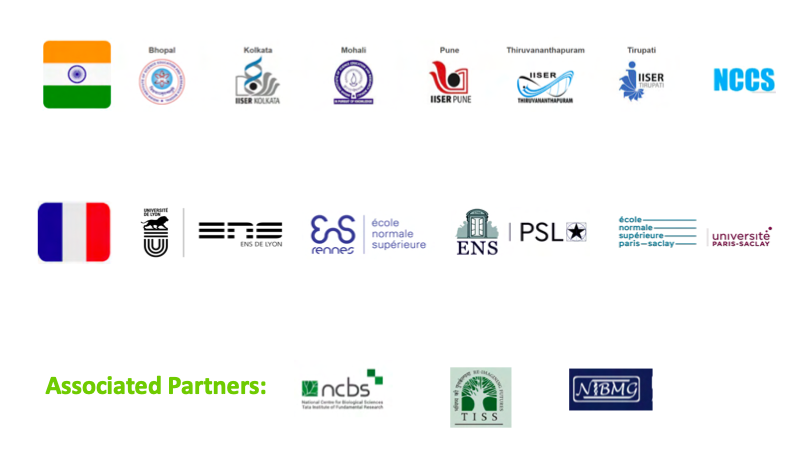
The BSX project is composed of 11 main partners across France and India.
- 4 ENS (Écoles normales supérieures): Lyon, Paris, Paris-Saclay and Rennes
- 6 IISER (Indian Institutes of Science Education and Research): Pune, Bhopal, Kolkata, Mohali, Tirupati and Thiruvananthapuram
- The NCCS (National Centre for Cell Science) Institute
With those main partners comes three additional associated partners which are:
- NCBS (National Centre for Biological Sciences)
- NIBMG (National Institute of Biomedical Genomics)
- TISS (Tata Institute of Social Sciences)
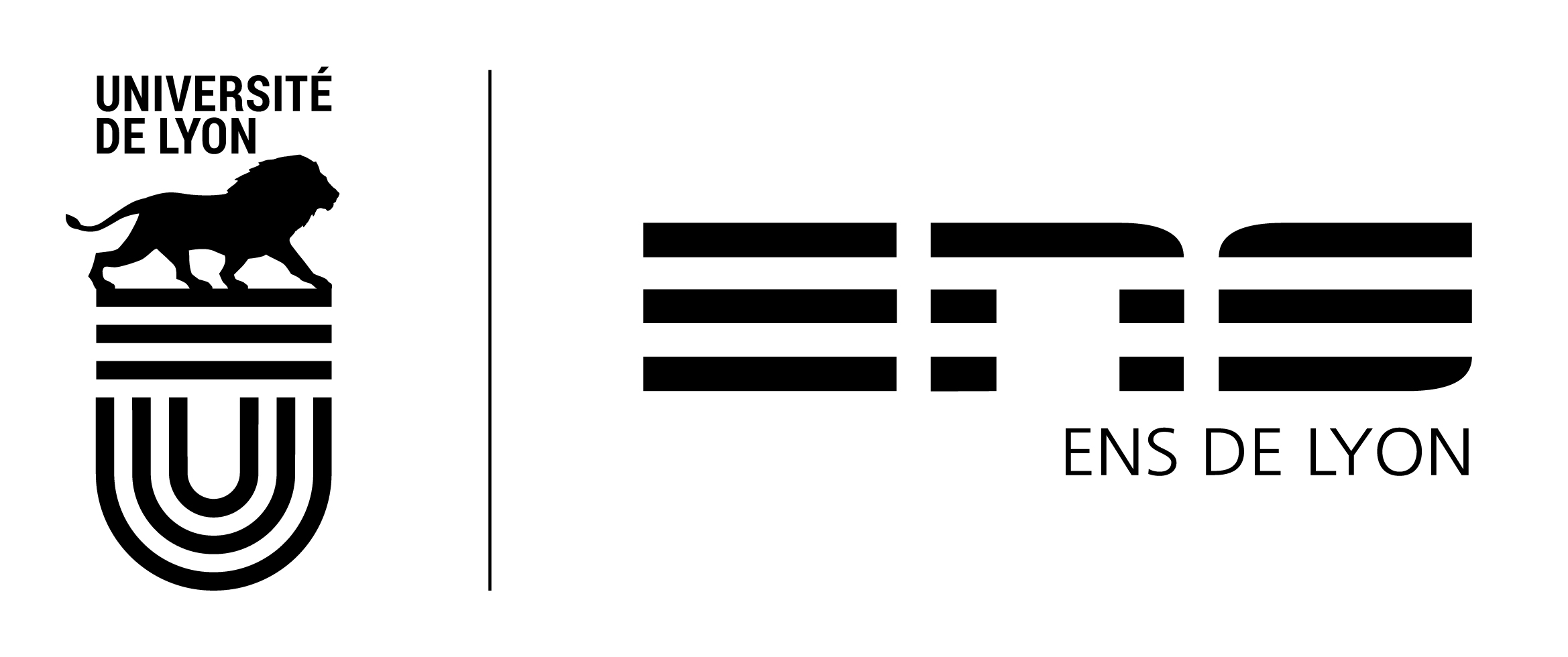 The ENS de Lyon is small-size, high level, multidisciplinary, research-oriented graduate university, located in the heart of France's second largest metropolis, less than two hours by train from Paris, Marseille, Geneva and Europe's finest ski slopes.
The ENS de Lyon is small-size, high level, multidisciplinary, research-oriented graduate university, located in the heart of France's second largest metropolis, less than two hours by train from Paris, Marseille, Geneva and Europe's finest ski slopes.
With researchers, professors and students from about 60 nationalities, the ENS de Lyon represents world-embracing excellence in higher education and research at the intersection of Exact Sciences, the Humanities, the Arts and the leading edge of Educational Science with the Institut Français de l’Education.
Master's programs
The Master's training offer is largely fundamental, generalist and of high level, it is oriented towards genetic cellular and molecular mechanisms at multiple scales including computational and modelling, in direct link with the themes developed in the 4 biology laboratories located at the ENS de Lyon (International Center for Research in Infectiology, Laboratory of Biology and Modeling of the Cell, Institute of Functional Genomics of Lyon, Laboratory of Reproduction and Development of Plants) and in close collaboration with research organizations (Inserm, Pasteur Institute) and the BSL4 laboratory of Lyon. The transdisciplinary approach, as in the other ENS, is at the heart of the training.
Research laboratories
Contact:
international.strategy [at] ens-lyon.fr (international[dot]strategy[at]ens-lyon[dot]fr)

The ENS-PSL Paris, at the same time a French grande école and a university, provides in Paris, at the heart of the Quartier latin, excellent training through research, leading to various teaching and research professions, and contributes to train through research the senior executives of public administrations as well as of French and European companies. The ENS also defines and applies scientific and technological research policies, from a multidisciplinary and international perspective.
Intellectual freedom, multidisciplinarity in humanities and sciences, individual attention to students, bountiful campus life, gathering students and professors from all disciplines, form the heart of the specificities of the Ecole normale supérieure. Since more than 2 centuries, the ENS prepares its students to the most various openings and the highest responsibilities, while being fully invested in the intellectual, scientific and cultural debates of its time – in particular through the multiplicity of the normaliens’ engagement.
Master's programs
Thanks to the cooperation between the ENS research center and numerous partner universities, many different master’s programs are offered on a wide range of topics at the ENS.
The ENS master’s programs are two-year programs (M1, M2) with periods of courses and advanced seminars, and periods of research in France and/or abroad.
Just like the PHD programs, the master’s programs are part of a PSL global offer. The different programs are sorted by options, and are mostly organized according to combined specialities. Apart from the master’s programs dedicated to research, some master’s programs in Letters prepare for the “agrégation“ during the second year of the program.
The students enrolled in these master’s programs are either ENS students preparing for their ENS diploma, or master’s students selected by the jury of the master’s program.
Research laboratories
Contact:
dri [at] ens.psl.eu (dri[at]ens[dot]fr)
Useful links:
École normale supérieure de Rennes, a long- standing tradition of excellence in research and education.
standing tradition of excellence in research and education.
Officially established on the 1st of January 2014, the École normale supérieure de Rennes (Grande Ecole) is a top-ranking graduate research institution whose mission is to prepare young students for careers in higher education, research and innovation. Originally founded in 1994 on the modern, technological Ker Lann Campus, near Rennes, as a satellite of the ENS Cachan (founded in 1912), the institution very quickly became a benchmark for excellence. ENS Rennes offers high-level scientific and cultural training, in the fields of Economics - Law - Management, Computer Science, Mathematics, Engineering Sciences, Mechatronics, Sport Sciences and Physical Education, Environmental Sciences.
The highly selective admission process (recruiting 1 out of every 1000 high school graduates per year) and strong research orientation (70% of all Master graduates pursue to PhD) makes ENS Rennes one of the top ranked and highly competitive Grandes Ecoles in France.
Since its foundation, the institution has been a focal point of original research supported by the best local and national laboratories in a variety of fields, in particular: European Law, High-speed Manufacturing, Large Systems Computing and Virtual Reality, Mathematics, the study of Sports Movement, Bio-Microsystems and Energy Management, Environmental Sciences.
As one of the four Écoles normales supérieures (ENS) in France, high standards and quality are hallmarks of this institution. Only the most optimal conditions are proposed to the students (under- and postgraduate) and researchers so as pursue its long-standing tradition of prestige and excellence in education and research.
Master's programs
The ENS Rennes Master's programs are co-accredited with institutions in the Rennes area: the University of Rennes, the University of Rennes 2, the Institut d’Etudes Politiques Rennes, INSA, EHESP. They are open to all students with a European degree or equivalent. The students enrolled in these master’s programs are either ENS students preparing for their ENS diploma, or master’s students selected by the jury of the master’s program.
The École normale supérieure de Rennes offers master’s degrees in the fields of fundamental sciences, engineering sciences and human and social sciences.
These are two-year programs (M1, M2) with periods of courses and advanced seminars, and periods of research in France and/or abroad. Just like the PHD programs, the master’s programs are part of a global offer. The different programs are sorted by options and are mostly organized according to combined specialities. Apart from the master’s programs dedicated to research, some master’s programs prepare for the “agregation examination» during the second year of the program.
Here are some links to some of our masters’ programs.
- Environmental Sciences PhD Track: 4 offers of master’s programs
- Computer Sciences : 2 master’s programs
- Sports Science: master’s degree in life and health sciences
- General master’s information under the ENS diploma track:
For more information please contact the International Office in order to get in touch with a faculty member.
Research laboratories
Since its foundation, ENS Rennes has been a focal point of original research supported by the best local and national laboratories in a variety of fields. Research activities are organised around 11 partner laboratories as described below.
As for research fields closely linked to the BIOSANTEXC project, the following presentation summarizes the main topics at ENS Rennes related to life and health sciences:
RESEARCH ACTIVITIES ORGANISED AROUND 11 PARTNER LABORATORIES
Law-Economy-Management:
Computer Science and virtual reality:
Mathematics:
Mecatronics / Engineering Sciences:
- Laboratoire SATIE (équipes BIOMIS et SETE) : Bio-Microsystems, Renewable Energies
- Laboratoire GeM (équipe PMM) : prototyping and high-speed machining
- Laboratoire IRISA (équipe MimeTIC)
- Laboratoire IETR (équipe MM)
Sports Sciences and physical education:
- Laboratoire M2S (movement – biomechanics - physiology)
- Laboratoire VIPS2 (human science approach to sports sciences)
Environmental Sciences:
- OSUR : a federation of 10 research units strongly invested in environmental research
Contact:
Head of international cooperation:
Deborah.france-piquet [at] ens-rennes.fr (Deborah[dot]france-piquet[at]ens-rennes[dot]fr)

The École normale supérieure (ENS) Paris-Saclay, a higher education institution for careers in research and higher education, aims for its students to continue on to doctorates. After a rigorous selection process, they take courses in basic sciences, human and social sciences or engineering science.
ENS also offers several original research training courses on topics such as quantum technologies, artificial intelligence and research-creation, as well as immersion in major international laboratories.
Established on the Saclay plateau since 2020, ENS Paris-Saclay runs the Graduate School for Professional Careers in Research and Higher Education of the Université Paris-Saclay, France’s leading university (16th University in the World – ARWU 2022). Its large world-class scientific and technological campus brings together universities, higher education institutions and research organisations.
Along with the three other French ENS (Lyon, Paris and Rennes), ENS Paris-Saclay carries out a public service, taking the best students into academic careers and all careers in the public and private sectors requiring a high level of scientific expertise.
Master's programs
As both a school and a centre for research, ENS Paris-Saclay is faithful to the Écoles normales supérieures’ tradition of excellence and bolstered research-led disciplinary training with an international and multidisciplinary outlook. The range of master’s programmes linked with Biosantexc offered at ENS Paris-Saclay covers different fields in sciences and social sciences:
- Master of infectiology in Phnom Pehn (M1-M2)
- Master de sociologie contemporaine (M1-M2)
- M2 MONABIPHOT, a master’s in physics at the interface with biology and chemistry
- M2 Molecules chemistry and interfaces.
This list may continue to evolve according to new training opportunities that will arise within the project.
Research laboratories
Laboratories specialized in Biology
Laboratories with potential interest in Health :
Contact:
ri [at] ens-paris-saclay.fr (ri[at]ens-paris-saclay[dot]fr)
Useful links:
The Indian Institute of Science Education and Research (IISER) Pune i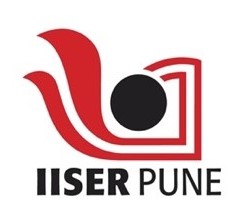 s a premier institute dedicated to research and teaching in the basic sciences. Established in 2006 by the Ministry of Human Resource Development (renamed Ministry of Education in August 2020), it is a unique initiative in science education in India devoted to both teaching and research in a totally integrated manner, with state-of-the-art research and high-quality education, thus nurturing both curiosity and creativity.
s a premier institute dedicated to research and teaching in the basic sciences. Established in 2006 by the Ministry of Human Resource Development (renamed Ministry of Education in August 2020), it is a unique initiative in science education in India devoted to both teaching and research in a totally integrated manner, with state-of-the-art research and high-quality education, thus nurturing both curiosity and creativity.
In addition to a 5-year integrated BSMS Master's programme, it also offers iPhD and PhD programmes across most departments. Apart from classroom instruction, IISER Pune builds student skills in areas such as scientific inquiry, problem solving, communication skills, computational sciences, electronics and instrumentation and workshop practices. In the advanced teaching and research labs of the institute, students have the opportunity to pursue experiments as well as advanced research under the mentorship of world-class faculty. Eventually, this should make education and careers in basic sciences more exciting and rewarding.
Master's programs
The two-year Master of Science (MSc) programme was launched in the Academic year 2022-2023. It is aimed at highly motivated students with a bachelor's degree in any branch of science, who are interested in an intense in-depth enquiry in specialized areas of research and education, as available in different Departments in IISER Pune. This programme has an increased emphasis on course-work with research experience gained through short semester credit projects, summer training and a major research project in the second year.
Course overview
Each Department has designed a blend of coursework and research projects spread over four semesters. The Departments of Chemistry, Earth and Climate Science, and Mathematics will offer the Programme in the Academic Year 2022-23, followed in subsequent years by other IISER Departments.
Research laboratories
IISER Pune has 8 departments, each of which have their own research programs.
Department of Biology: Research in specifically this department involves a range of contemporary and frontier areas relevant to biological systems. We represent a broad swathe of focus areas, involving both molecular as well as a systems-level understanding of biological systems. We encourage collaborative and cross-disciplinary research that integrates physical and engineering principles to answer key biological questions.
Contact:
dean.iro [at] iiserpune.ac.in (dean[dot]iro[at]iiserpune[dot]ac[dot]in)
Indian Institute of Science Education and Research Tirupati (I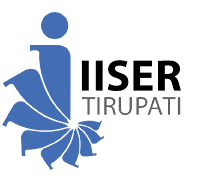 ISER Tirupati) is the sixth Institute in the chain of IISERs established by the Government of India under the Ministry of Education for imparting quality education in basic sciences and for setting up state-of-the-art research facilities for frontline and cutting-edge research in science.
ISER Tirupati) is the sixth Institute in the chain of IISERs established by the Government of India under the Ministry of Education for imparting quality education in basic sciences and for setting up state-of-the-art research facilities for frontline and cutting-edge research in science.
The vision of IISER Tirupati is to be a technology-based, research-driven Institute of Excellence in the realm of the Basic Sciences in which the instructional process at all levels of education that it offers is seamlessly inter-mixed and integrated with undertaking of state-of-art research. Faculty and students come from different parts of the country, giving rise to a culturally rich and vibrant environment. IISER Tirupati is located in Andhra Pradesh, which is in the southern part of India.
Master's programs
Research programs at IISER Tirupati span across all the basic sciences (Biology, Chemistry, Physics and Mathematics).
For Master’s (in Biology), IISER Tirupati offers fundamental and high-level training in cutting-edge research areas in Biology, ranging from single cell to ecosystem and evolution. Research themes in Biology include Cancer Biology, Genome Biology, Infectious & Parasite Biology, Plant and Animal Developmental biology, Neurobiology, Biochemistry, Ecology & Evolution. It also has Interdisciplinary research areas such as Genomics & Systems Biology, Chemical Biology and Single Molecular Biophysics.
State-of-Art research facilities are available on campus along with an upcoming BSL3 facility. IISER Tirupati, located in a techno-science educational hub, has close collaborations with neighbouring institutes such as Indian Institute of Technology Tirupati (IIT Tirupati), Acharya NG Ranga Agricultural University (ANGRAU). It provides a rich environment for high-quality, interdisciplinary training in fundamental research with the scope for transnational research.
Research laboratories
Our research programmes span diverse areas such as Cancer Biology, Genome Biology, Infectious & Parasite Biology, Plant & Animal Developmental biology, Neurobiology, Biochemistry, Ecology & Evolution.
Contact:
iro [at] iisertirupati.ac.in (iro[at]iisertirupati[dot]ac[dot]in)
The Indian Institute of Science Education and Research Bhopal (IISER Bhopal) 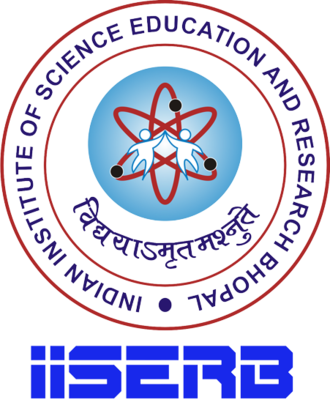 was established by the Government of India. The central focus of IISERB is to build a highly interdisciplinary and competitive teaching and research environment that caters not only to the academic and professional development of the students and faculty but also aspires to bring a positive impact on society and work towards a sustainable environment. Currently, the Institute has Natural Sciences, Engineering Sciences, Humanities & Social Sciences Streams.
was established by the Government of India. The central focus of IISERB is to build a highly interdisciplinary and competitive teaching and research environment that caters not only to the academic and professional development of the students and faculty but also aspires to bring a positive impact on society and work towards a sustainable environment. Currently, the Institute has Natural Sciences, Engineering Sciences, Humanities & Social Sciences Streams.
Master's programs
The Institute offers Bachelor of Science - Master of Science (BS-MS) Dual Degree; the programme integrates classroom learning with research and provides ample scope for multidisciplinary interactions. In addition, Two years M.Sc. Programme is offered for bright and motivated students with bachelor’s degree in relevant discipline. The Master’s programme is currently offered in the Departments of Biological Science, Chemistry and Mathematics. The programme aims to provide young, motivated individuals with a rigorous training, desired level of scientific understanding, and a glimpse of global contemporary research at an early stage to enable them to pursue a career in science education and research.
The training during the above programmes aimed to enable students to pursue a career in academia, R&D institutes, and science-based industries.
Research laboratories
- Dr. Ajit Chande
- Dr. Atul Kumar
- Dr. Debasis Nayak
- Dr. Chandan Sahi
- Prof. Himanshu Kumar
- Dr. Jeet Kalia
- Dr. Nagarjun Vijay
- Prof. R Mahalakshmi
- Prof. Raghuvir Singh Tomar
- Dr. Ram Kumar Mishra
- Dr. Sanjeev Shukla
- Dr. Sourav Datta
- Dr. Sunando Datta
- Dr. Varun Chaudhary
- Prof. Vikas Jain
- Dr. Vimlesh Kumar
- Dr. Vineet Kumar Sharma
- Dr. Vinita Gowda
Contact:
Office of Dean, Alumni and International Relations: office_dair [at] iiserb.ac.in (office_dair[at]iiserb[dot]ac[dot]in)
Head, Department of Biological Sciences: hod_bio [at] iiserb.ac.in (hod_bio[at]iiserb[dot]ac[dot]in)
Useful links:
Indian Institute of Science Education an d Research Kolkata (IISER Kolkata) was established in 2006 by the Ministry of Human Resource Development (MHRD), now Ministry of Education (MoE), Government of India. IISER Kolkata is an autonomous institution awarding its own degrees. The central theme of the IISER Kolkata is to integrate education with research so that undergraduate teaching as well as doctoral and postdoctoral research work could be carried out in symbiosis.
d Research Kolkata (IISER Kolkata) was established in 2006 by the Ministry of Human Resource Development (MHRD), now Ministry of Education (MoE), Government of India. IISER Kolkata is an autonomous institution awarding its own degrees. The central theme of the IISER Kolkata is to integrate education with research so that undergraduate teaching as well as doctoral and postdoctoral research work could be carried out in symbiosis.
Master's programs
IISER Kolkata offers an integrated MS-PhD program in Biology, Earth Sciences and Physics, and a Master’s program in Chemistry and Mathematics. The programs include extensive theoretical and laboratory training, and prepares students for careers in research and beyond.
Research laboratories
- Host-Pathogen Interaction Lab
- Anuradha Bhat Lab
- Membrane Trafficking Lab
- Cell Biophysics Lab
- COVID Biology Group
- Malancha Ta Lab
- Theoretical & Computational Biophysics Group
- ilab
- Molecular Signaling Group
- Rupak Datta Lab
- Sumit Sen Santara Lab
- Dog lab
Contact:
adoiro [at] iiserkol.ac.in (adoiro[at]iiserkol[dot]ac[dot]in)
The Indian Institute of Science Education and Research Mohali is 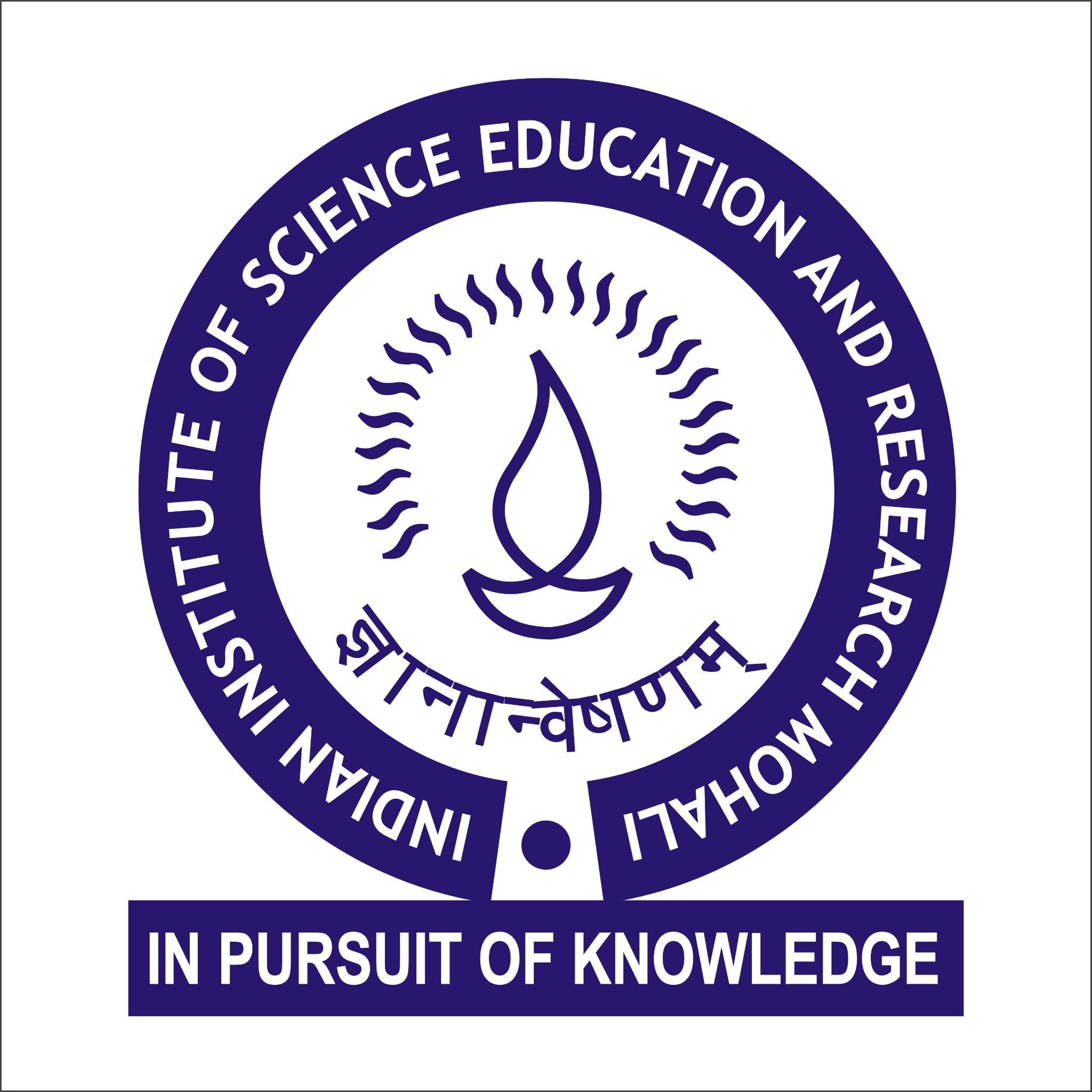 an Institute of National Importance in India that is established through an act of Indian Parliament, in order to impart quality science education and inculcate the spirit of research through innovative teaching and research methodologies.
an Institute of National Importance in India that is established through an act of Indian Parliament, in order to impart quality science education and inculcate the spirit of research through innovative teaching and research methodologies.
Over the last 15 years it has emerged as a preferred destination for academically gifted students from across the country. It admits students for integrated masters, integrated PhD and doctoral programs. The faculty members have research collaborations all across the globe. They have received highly competitive fellowships and grants and are contributing as authors as well editors in many reputed scientific journals. Master's students are encouraged to engage themselves in student mobility programs while pursuing their year long masters thesis.
Apart from the core subjects of basic sciences, such as Physics, Chemistry, Biology and Mathematics the Institute also imparts education in Data Science, Science Education, Science and Society Studies, Astronomy and Earth Sciences, where students may opt for a minor degree along with their major course of study.
Masters' programs
The master’s training at IISER Mohali is available in various diverse areas such as virology, neurobiology, immunology, stem cell and developmental biology, membrane trafficking, retina regenerative medicine, epigenetics, microbial genetics and metabolism, protein engineering, protein folding and biological phase separations, evolutionary biology and animal behaviour.. The research groups are supported by several advanced research facilities. This also includes an excellent animal facility. These facilities are available to master trainees. In addition, in-campus accommodation, access to sports and medical facilities is also available to masters students.
Research laboratories
While the BIOSANTEXC project has large participation from the Department of Biological Sciences, an interaction with other departments in IISER Mohali is possible on many research themes. The website of the Department of Biological Sciences, through which various research groups can be accessed is here.
Contact:
deanoutreach [at] iisermohali.ac.in (deanoutreach[at]iisermohali[dot]ac[dot]in)
Useful links:
The Indian Institute of Science Education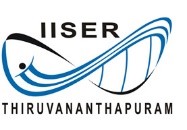 and Research Thiruvananthapuram (IISER TVM) is dedicated to scientific research and science education of international standards. IISER TVM was founded in 2008.
and Research Thiruvananthapuram (IISER TVM) is dedicated to scientific research and science education of international standards. IISER TVM was founded in 2008.
The institute aims to provide high quality education in modern science, integrating it with outstanding research at the undergraduate level itself, and to develop a spirit of enquiry cutting across disciplines. IISER TVM is an autonomous institution offering a five-year BS-MS programme in addition to MSc, iPh.D and Ph.D. programmes in Biology, Chemistry, Mathematics, Physics, Data sciences, and inter-disciplinary areas.
Master's programs
IISER Thiruvananthapuram offers a five- year integrated bachelor's and master's degree (BS-MS). The curriculum provides training in the fundamentals of natural sciences, mathematics, and computation, and then lets one choose the area that one would like to pursue and specialise in. Students enrolled in BS MS dual degree programme have a choice to get a master’s degree in one of the four basic sciences or they can choose from one of the five newly conceptualised integrated and interdisciplinary sciences (i 2 sciences) streams. (Details: here) .
In addition, the two year Master of Science (M.Sc.) programme of IISER Thiruvananthapuram will extend the training in science set in a vibrant research environment to bright undergraduate students selected competitively from across the country. The M.Sc. programme is expected to feed into the PhD programme of the institute while encouraging the students to take up further studies that leads to a career in scientific research, development, innovation and teaching.
(Details: here)
Research laboratories:
- All research groups in the School of Biology, IISER TVM
- Cancer therapy, Drug discovery, Nanotoxicology
Contact:
placement [at] iisertvm.ac.in (placement[at]iisertvm[dot]ac[dot]in)
Contact list:
National Centre for Cell Science (NCCS) is an autonomous research organi zation under the Department of Biotechnology, Government of India. It is a premier institute involved in cutting-edge research and human resource development in areas of Modern Biology. The institute hosts a wide range of scientists addressing different aspects of basic and disease biology. NCCS is located inside the S. P. Pune University Campus and imparts excellent multidisciplinary research training. It also serves as the national repository of cell lines which are distributed to researchers all across India.
zation under the Department of Biotechnology, Government of India. It is a premier institute involved in cutting-edge research and human resource development in areas of Modern Biology. The institute hosts a wide range of scientists addressing different aspects of basic and disease biology. NCCS is located inside the S. P. Pune University Campus and imparts excellent multidisciplinary research training. It also serves as the national repository of cell lines which are distributed to researchers all across India.
Master's programs:
Currently, NCCS does not offer Master’s programs, but the program is expected to start following the restructuring of the DBT institutes including NCCS, under the Biotechnology Research and Innovation Council (BRIC). However, NCCS can offer 3-6 months of research training to Master’s students from the participating French entities. NCCS scientists work in the following areas.
- Cell Organization and Function
- Genome Architecture and Regulation
- Regulatory RNAs and Gene Expression
- Neuroscience
- Stem Cells and Regeneration
- Biology of Cancer and Chronic Diseases
- Pathogenesis and Cellular Response
- Macromolecular Structure and Function
- Microbial Ecology
Details are provided on our website.
Research laboratories
- Mohan Wani, Ph.D. (Bone and Cartilage Cell Biology)
- Bhaskar Saha, Ph.D. (CD40 signaling and Leishmaniasis)
- Arvind Sahu, Ph.D. (Complement biology and diseases)
- Sandhya Sitaswad, Ph.D. (Free Radicals in Cancer & Diabetes)
- Sharmila Bapat, Ph.D. (Biology of Ovarian Cancer)
- Nibedita Lenka, Ph.D. (Embryonic Stem Cells)
- Vasudevan Seshadri, Ph.D. (RNA-binding proteins in diseases)
- Jomon Joseph, Ph.D. (NPC, ER-mitochondria and sEVs
- Girdhari Lal, Ph.D. (Inflammation in Autoimmunity)
- Manas Santra, Ph.D. (E3 Ubiquitin ligases and Cancer)
- Radha Chauhan, Ph.D. (NPC structure and Functions)
- Deepa Subramanyam, Ph.D. (Stem Cells and Trafficking)
- Shailza Singh, Ph.D. (Computational and System Biology)
- Srikanth Rapole, Ph.D. (Proteomics in Cancer)
- Janesh Kumar, Ph.D. (iGluRs Structure and Function)
- Vidisha Tripathi, Ph.D. (Non-coding RNAs and Cell Cycle)
- Amitabha Majumdar, Ph.D. (Memory and Neurodenerative Diseases)
- Nishant Singhal, Ph.D. (Stem Cells and Neurobiology)
- Gaurav Das, Ph.D. (Learning and Behaviour)
- Akanksha Chaturvedi, Ph.D. (B-cell Biology)
- Avinash Sharma, Ph.D. (Microbial Ecology)
- Dhiraj Dhotre, Ph.D. (Human Microbiome)
- Santosh Kumar, Ph.D. (GPCRs Cell Biology & Biochemistry)
- Prasad Abnave, Ph.D. (Infection and Adult Stem Cells)
- Amit Yadav Ph.D. (Non-cultivable pathogens)
Contact:
academics [at] nccs.res.in (academics[at]nccs[dot]res[dot]in)
Useful links:
The National Centre for Biological Science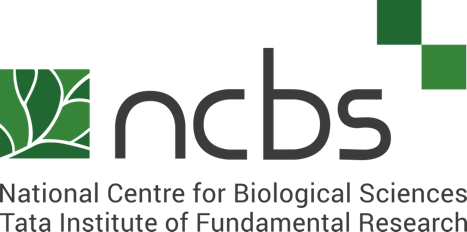 s in Bangalore, Karnataka, specialises in biological research. It is a part of the Tata Institute of Fundamental Research under the Department of Atomic Energy of the Government of India. To understand living systems, NCBS approaches research problems from various directions and hosts researchers with diverse backgrounds, including natural sciences, mathematics, physics and computer science.
s in Bangalore, Karnataka, specialises in biological research. It is a part of the Tata Institute of Fundamental Research under the Department of Atomic Energy of the Government of India. To understand living systems, NCBS approaches research problems from various directions and hosts researchers with diverse backgrounds, including natural sciences, mathematics, physics and computer science.
The institute is also home to state-of-the-art research facilities that are used by scientists on the campus and also provides research aid worldwide. Students, research fellows, and post-doctoral fellows form the core of a dynamic and vibrant NCBS research community, with laboratory and lecture courses, seminars, symposia and meetings with participants from all over the world.
Master’s programs:
Research at NCBS is across scales and disciplines, and the postgraduate programmes take this ethos to heart. Around 35 labs are working on problems from theoretical modelling to ecosystem management. Training is a mixture of specialised course work and hands-on research work with advanced training on facilities (such as imaging, mass-spec, EM etc.) as needed.
Contact:

The National Institute of Biomedical Genomics (NIBMG) has been established as an autonomous institution by the Government of India, under the aegis of the Department of Biotechnology. This is the first institution in India explicitly devoted to research, training, translation & service and capacity-building in Biomedical Genomics. It is located in Kalyani, West Bengal, India, near Kolkata. The huge 30 acre campus of the Institute has academic blocks, student and faculty housing, guest houses, conference centre and other facilities.
The research focus of the institute is to understand the molecular basis of disease using genomics and integrative biology, as well as functionalization of genomic leads. The broad areas of research pursued at NIBMG are: A. Cancer, B. Infectious disease C. Chronic disease, D) Computational Biology and Statistical Genomics.
NIBMG is equipped with state-of-the art technologies that include high throughput Next Generation Sequencing (NGS) platforms, Mass-proteomics platform, High-performance computing (HPC) platform connected with Lustre file system , FACS, Confocal Microscopy imaging facility, zebrafish and others.
Master's programs
NIBMG has initiated an Integrated MS-PhD program. Students admitted into the program undergo Master’s Program during the first two years. This includes Master’s projects to be carried out in a research lab(s) under the mentorship of NIBMG faculty, during the third and fourth semesters. After completion of 4th Semester, students need to appear for a comprehensive test to evaluate their suitability to continue PhD programme. Otherwise the student will be awarded with MS Degree with MS dissertation.
After switching over to PhD program, PhD thesis to be submitted, not earlier than 3 years or later than 5 years. The Master courses focus on basic biology such as Biochemistry, Cell Biology, Molecular Biology, Human Genetics and Genomics, Biostatistics, Data Analysis (in R) and includes courses related with genetic aspects of human diseases such as cancer, infectious and chronic diseases. Along with the lectures and practical’s, each student can undergo research lab rotation of the major research areas: ( Cancer, Infectious disease, Chronic disease and Computational Biology and Statistical Genomics) first two semesters.
Research laboratories
Cancer Genomics :
Sagar Sengupta
Kartiki V. Desai
Arindam Maitra
Anupam Basu
Sandeep Singh
Srikanta Goswami
Nidhan K. Biswas
Arvind Korwar
Chronic /Complex Disease:
Arindam Maitra
Anupam Basu
Priyadarshi Basu
Moulinath Acharya
Souvik Mukherjee
Mahua Maulik
Infectious Disease
Saroj Kant Mohapatra
Sreedhar Chinnaswamy
Bhaswati Pandit
P B Raghavendra
Anup Mazumder
Statistical and Computational Genomics
Analabha Basu
Samsiddhi Bhattacharjee
Nidhan K. Biswas
Anasuya Chakrabarty
Contact:
Dr. Anupam Basu, Associate Director, coordinator for the Biosantexc Program:
ab3 [at] nibmg.ac.in (ab3[at]nibmg[dot]ac[dot]in)
Useful links:
Tata Institute of Social Sciences is a multi-campus, integrated, community 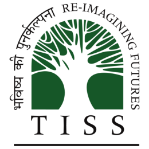 engaged public university of India. TISS is among the top 40 Indian universities today and one of the finest in terms of promoting excellence in teaching, research, field/ internship- based learning, and social innovation and social start-ups.
engaged public university of India. TISS is among the top 40 Indian universities today and one of the finest in terms of promoting excellence in teaching, research, field/ internship- based learning, and social innovation and social start-ups.
Master’s training
TISS offers some of the most contemporary and socially relevant, globally acknowledged study programs in social sciences, public health and applied human service professions.
Research laboratories
Over the years, the role of academic institutions like TISS in conducting pioneering research and extension activities rooted in the context of societal realities, and aimed at influencing policy and practice for positive social change, has been widely acknowledged.
Useful links:
